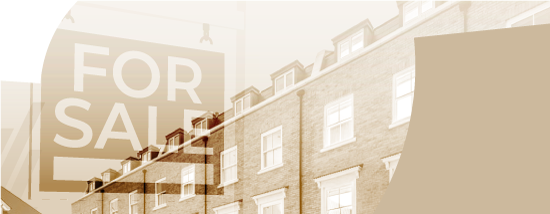Buying a house in 2023 can seem daunting – the exorbitant prices of today’s housing market and the lengthy and confusing process are enough to discourage any first-time buyer and cause them to weigh the benefits of renting vs buying. While there’s little to be done about market prices, we can at least try to lift some of the confusion around the process, so you know what to expect from start to finish!
| 🏠 How long is the process to buy a house? | Depending on the market and assuming that everything goes as smoothly as possible, it takes around 5 months to find a house, make an offer and close the deal in the UK. |
| 💰 How much should I save before I’m ready to buy? | Usually, you can expect to pay forward anywhere between 5-20% of the value of the property, so the size of the deposit you will need to put down will depend on the buying value. |
| 💵 How do I make an offer on a property? | You will need to reach out to the estate agent representing the seller in order to express your interest and describe the details of your position. |
Once you’ve finally saved up enough in your stock and share ISA or investment account, and you’re able to make a sizable deposit on a flat, how do you start the process and how long does it take to buy a flat? Depending on the market and assuming that everything goes as smoothly as possible, it takes around 5 months to find a house, make an offer and close the deal in the UK.
The most time-consuming part of the process is undoubtedly finding the right property that fits your needs and your budget. This can take anywhere from 6 to 12 weeks. Applying for a mortgage, though not a fast process by any means, is typically much faster, especially if you have your finances and documents in order when applying. This can take from 2 to 4 weeks if you’ve prepared everything well beforehand. Making an offer and negotiating the price of the property can take up to 16 weeks and 2 to 4 weeks to finalise the sale.
When you break the house buying process down into phases, it becomes much more manageable. So, let’s take a look at some of the specifics of each phase so you’re better prepared to take on this new adventure!
Mortgage feasibility
Before you start searching for your property, it might be a good idea to check in with your bank in order to understand your eligibility to apply for a mortgage. In order to figure out if you are a higher-risk borrower and how much they are willing to lend you, the bank will take a look into your financial situation, looking at credit scores, income, how long you’ve been working, etc. Based on what they find, you can get a basic understanding of what your budget will be when looking for a property.
Finding a property
This phase is undoubtedly the most time-consuming and daunting of all. In order to find a property that is right for you, you need to define your search criteria so that you can refine your search and speed up the house-buying process. Property market liquidity also affects how long it will take to find a house.
Some important criteria you should decide to help you limit your search:
- What area are you looking to buy in?
- What kind of property are you looking to buy?
- How much are you willing to dedicate yourself to making renovations?
- How much are you willing to compromise on these criteria if faced with budget constrictions?
When looking to buy property, it’s important that you keep an open mind and are willing to make compromises. Otherwise, you may never move forward in the process. You may find a property that doesn’t fit the image of the property you had in mind for yourself, but remember, you can always find ways to make it yours!
Making an offer
Once you’ve found a property that meets your criteria and know you’re eligible for a mortgage, you’re ready to take the next big step in the house buying process – making an offer!
The specifics of how you go about making your offer may vary. Still, you will need to reach out to the estate agent representing the seller in order to express your interest and describe the details of your position. The agent will want to know things like what the size of your deposit will be (you’re responsible for providing the deposit, so make sure you learn how to save money for a house), if you’re buying a property for the first time or if you are selling another property.
If the estate agent is interested in what you propose, you’ll receive feedback between a few hours or days after expressing your interest.
Once you’ve made initial contact, the fun begins! The agent will most likely try to work up from your original proposal, and you will try to negotiate the selling point down until you reach an agreement.
Getting a Mortgage
When looking around for mortgage options, you’ll find that mortgage lenders have several different types of mortgages available. As a result, the process of applying for and being approved for a mortgage has become easier for the applicant.
If you are a first-time buyer who has never made a property purchase, first-time buyer mortgages are available, such as the help-to-buy equity Loan, the UK mortgage guarantee scheme, and a LISA account. First-timer buyers only need at least a 5% deposit of the cost of the home. However, if you want to buy a house, higher deposits mean better chances of being approved for a mortgage loan and lower monthly payments.
You can use a mortgage broker. A mortgage broker will serve as the middleman between you and the mortgage lender. They collate your information and help you find the best potential mortgage offer available. They act in your best interest.
That said, you can still try to speed things up and de-stress the process by making sure you are well prepared before you contact a mortgage lender– figure out how much you can afford to pay in mortgage payments each month, have all your documents available and make sure you leave with an Agreement in Principle before you make an offer.
Please note your mortgage lender will mortgage valuation to determine the value of the property you want to purchase. A mortgage valuation can help you determine if you are paying too much or too little for a property. Also, remember that a mortgage is a form of financial debt that needs to be paid off.
Signing the contract and completing the sale
In this final phase, while exchanging contracts, you have the chance to iron out all the more specific details of the purchase. Your direct involvement may vary depending on what details need to be ironed out. In the review and fine-tuning of the contracts, both parties in the transaction will rely on their solicitors to make sure everything is in order.
During this phase, you will have to lay down a deposit on the house while the contracts are signed, and you are waiting for the money to come through from the mortgage lender. The size of the deposit you will need to put down will depend but can range from anywhere between 5-10% of the value of the property.
Once the contracts have been signed and exchanged, there are still some last things you need to look after before settling into your new home. Make sure that your mortgage has been sent by your lender and that the previous occupants have removed all of their things and the house. This can often take longer than you might like, as the previous occupants may not always be quick about leaving the property.
Though the process can seem long and confusing for first-time buyers, luckily, there are plenty of resources available to help you understand what needs to be done and why.
The journey of paying off your mortgage starts after the contract completion day, and you move into your new home. Some people can decide to invest or pay off their mortgage if they have extra cash at the end of the month.
What timings to expect for each step
How long it takes to buy a house in the UK will vary depending on the housing market, but you can expect the process to last for up to half a year, if everything goes as planned! Of course, this will vary according to the specific circumstances in the sale, either yours or the seller’s.
- Depending on how arduously your search is, you can expect to find a property that fits your criteria and begin talks with the seller in the first six to twelve weeks.
- You can expect to have figured out the details around your mortgage in two to four weeks.
- Making an offer on the property and negotiating the terms of sale will likely be the most time-consuming phase of the process, taking up to sixteen weeks.
- Finally, once you’ve agreed to the terms of the sale, signing and exchanging contracts to finalise the sale can take between two weeks and one month to complete.
FAQ
How do I apply for a mortgage?
Set up an appointment with your bank to discuss your eligibility for a mortgage. When evaluating your eligibility for a mortgage, the bank will consider a look into your financial situation, looking at credit scores and income.
How many properties should I visit before making an offer?
While there is no right answer, most estate agents suggest seeing at least ten properties that meet your search criteria before you make an offer.
What if I change my mind about buying the property?
Though it’s always possible to back out of the deal, you may end up having to pay a forfeit of around 1-2% of the property’s value, which is why it is important to evaluate well before deciding.





